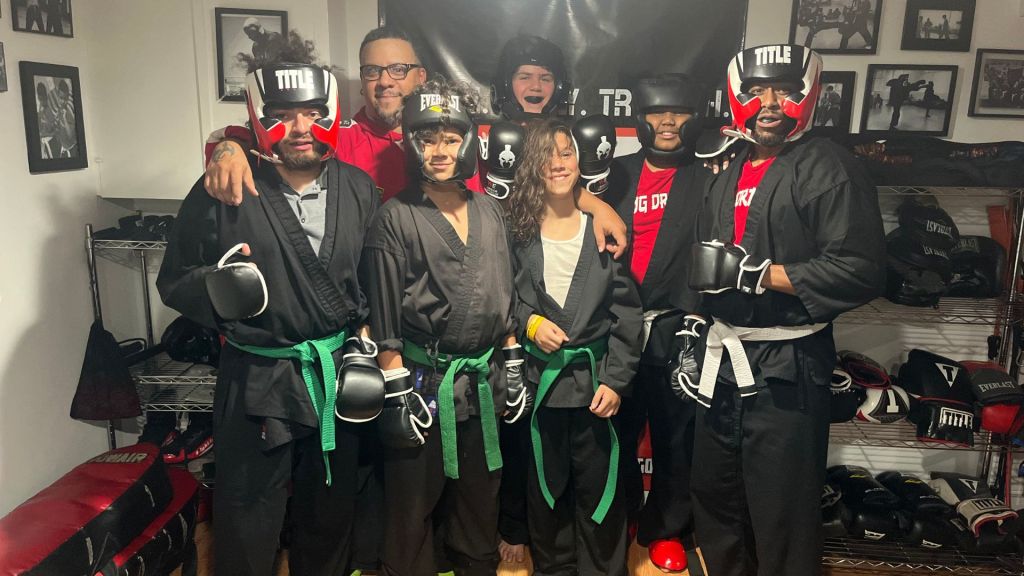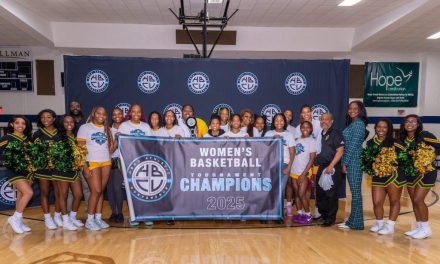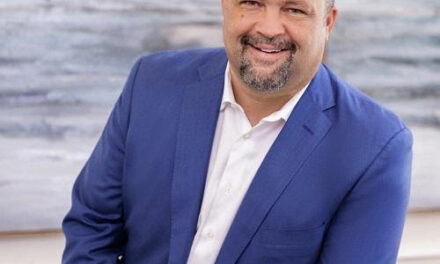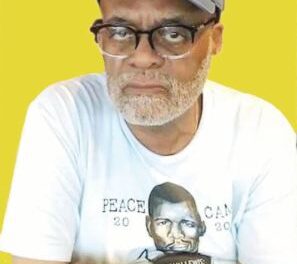By Megan Sayles
AFRO Staff Writer
msayles@afro.com
On a rainy winter night, Paul McFarland’s martial arts students gather in the Belair-Parkside neighborhood for class in a basement dojo, a space for learning and practicing meditation and martial arts.

Credit: AFRO Photo / Megan Sayles
The children start at 5 p.m. with strength and flexibility training. By 6 p.m., the teens and adults suit up in black uniforms, traditionally called “gi.” They are ready for conditioning, pad work and sparring.
McFarland’s team is small but mighty. He opened the dojo, Ring Dragon, at its current location five years ago not to run a business, but to make an impact.
“There are a lot of places that are just in business. I don’t want 500 students. I don’t want hundreds of students. I want 50 people who really want to do this,” said McFarland. “You don’t judge a master by how many students he has. You judge a master by how many masters he creates. That’s the goal.”
The 49-year-old grew up in Montgomery County and said his early heroes were Bruce Lee, Sugar Ray Leonard and Spiderman. He started martial arts himself at nine years old, working his way up to a brown belt, just one level away from black. However, at 16 his parents took him out of the sport because he wouldn’t commit to his homework.
McFarland said he was distracted by crushes at the time. Though he eventually achieved his black belt, he disagrees with his parents’ decision.
“I really can’t fault them because there’s no handbook, but I thought that was a mistake,” said McFarland. “Kids like that need to be in something constructive. If for nothing else, you’re putting all that angst and teen spirit into something constructive.”
As an instructor, McFarland continues to believe this to be true. He explained that martial arts can be used to teach people about the power of discipline, self-confidence and problem solving. He tries to push his students to foster their talents and to apply lessons from martial arts in their daily lives.
“Confidence comes from cultivating a skill and then having proven, factual instances where you have risen to an occasion or at least made it through,” said McFarland. “You don’t always win, but you’ve persevered. You’ve developed fortitude. You prove to yourself that you can deal with things whether it’s relationships, jobs or school.”
At Ring Dragon, he teaches a non-traditional Tang Soo Do program that incorporates aspects of boxing and muay Thai. He added that sparring, a main aspect of martial arts, is particularly good for teaching people how to think critically.
“It’s about your decision-making,” said McFarland. “There’s always going to be somebody who is faster, taller, longer, younger or more flexible. It’s about finding a way to get what you need out of a situation.”
One of McFarland’s students is his son, Shir. The 11-year-old attained his green belt last March and is aiming to get his purple belt in the new year. At age one, his father introduced him to martial arts. Shir said his favorite part about it has always been that it makes him feel stronger and, in turn, boosts his confidence.
Having his father as a teacher has been good. He admires his ability to think on his feet and his leadership skills—something Shir said he is trying to emulate.
“Everywhere on Earth has a leader. We have presidents, prime ministers, and if you know how to be a good leader and lead a team, you can basically do anything,” said Shir. “You can evolve someone into a better person so they can become a leader.”

Credit: AFRO Photo / Megan Sayles
When he grows up, Shir would like to be an animator. Knowing that college comes with a steep price tag, he said he’s hoping his commitment to his studies and to martial arts as an extracurricular can prepare him for scholarships.
He also plans to have his black belt by that time so he can earn money by teaching martial arts.
“Being a child is a small amount of time. You can either have fun later or have fun now and not have fun later. I already know I do not want to be working two or three jobs that I can’t stand and then have to wake up early for them just to get paid enough to get an apartment,” said Shir. “You have to put authority into your work. Martial arts doesn’t really affect your personal life, it makes it better.”
Shir’s current wish for his father’s martial arts program is that more girls will join. He explained that this intention is not because he’s looking for a girlfriend but because he wants girls his age to know how to defend themselves.
“Men are kind of weird, so knowing how to protect yourself in that situation would be pretty good,” said Shir. “If you learn how to do that, you’re not going to be as vulnerable in the world, and you can assert yourself.”
Morgan State University (MSU) student Christian Turcios was part of the motivation for the current iteration of Ring Dragon. He found the website for the dojo on Google and ended up giving McFarland a call. At the time, McFarland was unsure if he wanted to continue teaching martial arts, but Turcios’ interest encouraged him to keep going.
Turcios has used martial arts as a means of keeping his emotions in check.
“For me, martial arts is a good outlet. Every time I leave class, I feel calm, so I go into life very calm,” said Turcios. “That helps me because I used to walk around kind of irritable, angry or aggressive. It creates a new me, and that new me is better suited for everyday life.”
He noted that he has never left a class feeling as if it was a waste of time. He, like Shir, plans to become a mentor or teacher one day.
“This has been the second coach in my lifetime that has significantly made an impact in my life. I do believe that sports save lives,” said Turcios. “I know of many incidents where people feel lost without sports…they just give people a path.”
To learn more about Paul McFarland and Ring Dragon, please visit www.ringdragon.com.
This story is part of the Digital Equity Local Voices Fellowship lab. The lab initiative is made possible with support from Comcast NBC Universal.
The post In the dojo: How one martial arts program is building confidence and discipline appeared first on AFRO American Newspapers.











